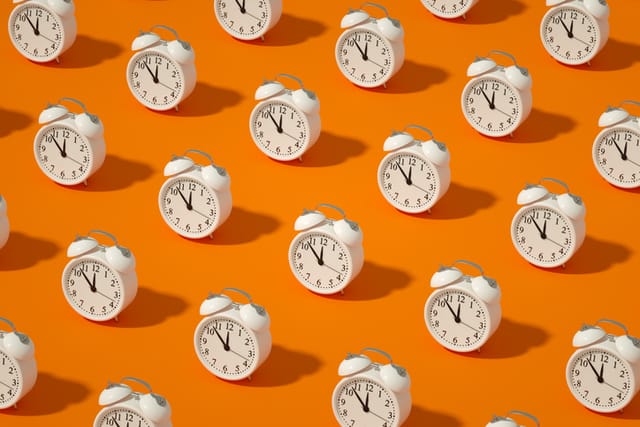For adults with ADHD — roughly 8.7 million people in the U.S., according to the latest data — finding ways to make their everyday lives less stressful and as functional as possible is a top priority. While there will always be times that the condition makes things more challenging than they might be for others, following these tips every day stems a lot of the anxiety and feelings of being overwhelmed that come along with ADHD.
1. Keeping a Consistent Daily Planner
People with ADHD often find that a daily planner is a lifesaver. It’s not just for jotting down appointments and deadlines — it helps by structuring the day to make it manageable. They might color-code activities or break down tasks into smaller steps to avoid feeling overwhelmed. Checking off completed tasks can be incredibly satisfying and motivating. The key is consistency – using the planner every day turns it into a helpful routine, not just a forgotten accessory.
2. Setting Multiple Alarms and Reminders

Alarms and reminders are more than just wake-up calls; they’re essential tools for staying on track. People with ADHD might set alarms for everything, from taking medication to starting a new task. These reminders help combat forgetfulness and keep the day flowing smoothly. It’s about externalizing the memory, so there’s less pressure to remember everything. Smartphones are great for this, as they can carry reminders wherever they go.
3. Creating a Dedicated Workspace

Having a specific area set up for work or study can make a huge difference. This designated space signals to the brain that it’s time to focus. Clutter is minimized, and everything needed is at hand, reducing the chance of getting distracted while searching for items. Personalizing the space with items that promote focus, like stress balls or fidget toys, can also be helpful. The goal is to create an environment that encourages concentration and minimizes distractions.
4. Using Timers for Task Management

Timers are a fantastic tool for managing tasks. They help break work into manageable chunks, making large tasks feel less daunting. The Pomodoro Technique, where work is divided into 25-minute intervals followed by short breaks, is popular. It turns a long study session or workday into a series of smaller, more achievable goals. Plus, knowing there’s a break coming up can help maintain focus during the work interval.
5. Organizing With Visual Aids

Visual aids can be incredibly helpful for people with ADHD. This might mean using color-coded files, labeled bins for different items, or having a whiteboard for visual planning. Seeing things laid out visually can make it easier to process and remember information. It also adds an element of fun to organization, turning a potentially tedious task into a more engaging activity. Visual systems provide clarity at a glance, which can be a big relief for a busy mind.
6. Developing a Routine for Mundane Tasks

Establishing a routine for everyday tasks can be a game-changer. This might include a set time for laundry, meal prep, or cleaning. Turning these mundane activities into a routine reduces the mental load of planning and decision-making. Over time, these tasks become automatic, freeing up mental energy for more demanding projects. Consistency is key here – the more ingrained the routine, the less effort it takes to stick to it.
7. Using Apps for Task Management and Organization
There are some fantastic apps out there designed to aid in organization and task management, perfect for those with ADHD. These apps can help track tasks, set reminders, and even block distracting websites during work hours. The trick is to find an app that resonates with your style – some people prefer simple to-do lists, while others might like more comprehensive project management tools. The right app can act like a digital assistant, keeping everything streamlined and in one place.
8. Breaking Down Big Projects Into Smaller Tasks

Large projects can seem overwhelming, but breaking them down into smaller, more manageable tasks can make them feel achievable. Each small task completed is a step towards the bigger goal, and it’s easier to start and finish these mini-tasks without getting overwhelmed. This approach also makes it easier to track progress, which can be a huge motivator.
9. Embracing Decluttering as a Regular Activity

Regular decluttering sessions can be incredibly beneficial. Clutter can be a significant source of distraction and stress, so keeping your environment tidy can help maintain focus. Scheduling a regular time each week to declutter and organize your space can keep things under control. It’s not about creating a spotless environment but rather maintaining a space that feels orderly and manageable.
10. Creating Specific Zones in Your Living Space

Having designated areas for different activities can help in staying organized. For example, having a specific spot for studying, another for relaxation, and another for hobbies can help in mentally compartmentalizing these activities. This physical separation helps in shifting gears between different types of tasks and can aid in maintaining focus on the task at hand.
11. Limiting Multitasking
While multitasking might seem efficient, it’s often counterproductive, especially for those with ADHD. Focusing on one task at a time ensures better quality and completion rates. This focused approach can reduce feelings of being overwhelmed and increase overall productivity. It’s about fully engaging with one task before moving on to the next.
12. Regularly Reviewing and Adjusting Your Strategies

What works today might not work tomorrow, and that’s okay. Regularly reviewing and adjusting your organizational strategies is important. This might mean changing your routine, trying a new app, or reorganizing your workspace. Flexibility and adaptability are key. It’s about finding what works for you at any given time and being open to change when something isn’t working anymore.
Like what you’ve read? Follow Bolde on MSN for more!





